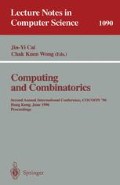Abstract
We investigate simple stochastic games (SSGs): a kind of two-person games under uncertainty, the original model of which was introduced in [L.S. Shapley, Proc. Nat. Acad. Sci. U.S.A. 39 (1953) 1095–1100]. We consider the computational complexity of
-
1.
deciding whether a given SSG is stopping (discounted) or not,
-
2.
counting the number of all the optimal strategies of SSGs,
-
3.
finding an optimal strategy against the player who takes random strategies.
Preview
Unable to display preview. Download preview PDF.
References
Aho, A.V., Hopcroft, J.E. and Ullman, J.D., The Design and Analysis of Computer Algorithms, Addison-Wesley, Reading MA (1974)
Borosh, I., and L.B. Treybig, “Bounds on positive integral solutions of linear Diophantine equations,” Proc. AMS 55 (1976) 299–304.
Condon, A., and Ladner, R.E., “Probabilistic Game Automata,” JCSS 36 (1988) 452–489.
Cai, J, Lipton, R.J., and Zalcstein,Y., “The complexity of the membership problem for 2-generated commutative semigroups of rational matrix”, Proc. of FOCS'94 (1994) 135–142.
Condon, A., “Computational Models of Games,” (An ACM distinguished Dissertation 1988) MIT Press, Cambridge, MA (1989).
Condon, A., “The Complexity of Stochastic Games”, Information and Computation 96 (1992) 203–224.
Condon, A., “On Algorithms for Simple Stochastic Games”, DIMACS Series in Discrete Mathematics and Theoretical Computer Science 13 (1993) 51–71.
Condon, A., Personal communication via email (July 1995).
Chandra, A.K. and M. Tompa, “The complexity of short two-person games,” Dis. Appl. Math. 29 (1990) 21–33.
Ehrenfeucht, A. and Myceilski, J., “Positive strategies for mean payoff games,” International J. of Game Theory 8 (1979) 109–113.
Even, T. and Tarjan, R.E., “A combinatorial problem which is complete in polynomial space”, JACM 23 (1976) 710–719.
Fraenkel, A.S. and Lichtenstein, D., “Computing a perfect strategy for n × n Chess requires time exponential in n,” J. Combinatorial Theory, Series A 31 (1981) 199–214.
Fraenkel, A.S. and Lichtenstein, D., “n by n checker is EXPTIME complete,” SIAM J. Computing 13(2) (1984) 252–267.
Filar, A. and Schultz, T., “Non-linear programming and stationary strategies in stochastic games,” Math. Programming 35 (1987) 243–247.
Greenlaw, R., Hoover, H., and Ruzzo, W.L., “A compendium of problems complete for P,” manuscript (1989).
[KK+93] Karmarkar, N. et al., “A Monte-Carlo algorithm for estimating the permanent,” SIAM. J. Comput. Vol.22, No.2, (1993) 284–293.
Hoffman, A. and Karp, R., “On nonterminating stochastic games,” Management Sci. 12 (1966) 359–370.
Jones, N.D., and Laaser, W.T., “Complete problems for deterministic polynomial time,” TCS 3(2) (1976) 105–117.
Ladner, R.E., “The circuit value problem is log space complete for P,” SIGACT News 7 (1975) 18–20.
Ludwig, W., “A subexponential randomized algorithm for the simple stochastic game problem,” I & C 117 (1995) 151–155.
Lichtenstein, D. and M. Sipser, “Go is polynomial-space hard,” JACM 27 (1980) 393–401.
Mathon, R., “A note on the graph isomorphism counting problem,” IPL 8 (1979) 131–132.
Melekopoglou, M., and A. Condon., “On the complexity of the policy iteration algorithm for simple stochastic games,” Univ. Wisconsin-Madison Computer Sciences Department Technical Report 941 (1990).
Papadimitriou, C.H., “Games against nature,” Proc. of FOCS'83; also JCSS 31 (1985) 288–301.
[Pra75]Prat, V.R., “Every prime has a succinct certificate,” SIAM. J. Comput. Vol.4, No.3, (1975) 214–220.
Papadimitriou, C.H. and Tsitsiklis, J.N., “The complexity of markov decision processes,” Math. Oper. Res., Vol.12, No.3, (1987) 441–450.
Rao, S.S., Chandrasekaran, and Nair, K.P.K., “Algorithms for discounted stochastic games,” J. Optim. Theory Appl. 11 (1973) 627–637.
Shapley, L.S., “Stochastic games,” Proc. Nat. Acad. Sci. U.S.A. 39 (1953) 1095–1100.
Schaefer. T.J., “On the complexity of some two person perfect-information games,” JCSS 29 (1984) 185–225.
Valiant, L.G., “The Complexity of Enumeration and Reliability Problems”, SIAM J. Comput. 8 (1979) 410–421.
Van Der Wal, J., “Discounted Markov games: successive approximations and stopping times,” Internat. J. Game Theory 6 (1977) 11–22.
Van Der Wal, J., “Discounted Markov games: generalized policy iteration method,” J. Optim. Theory Appl. 25 (1978) 125–138.
Yanbe, A. and Sakurai, K., “A short certificate of the number of universal optimal strategies for stopping simple stochastic games”, IPL57 (1995) 17–24.
Zwick, Uri and Paterson, M.S., “The complexity of mean payoff games”, Proceedings of 1st COCOON'95, LNCS 959, Springer (1995) 1–10.
Author information
Authors and Affiliations
Editor information
Rights and permissions
Copyright information
© 1996 Springer-Verlag Berlin Heidelberg
About this paper
Cite this paper
Yanbe, A., Sakurai, K. (1996). On the complexity of computational problems associated with simple stochastic games. In: Cai, JY., Wong, C.K. (eds) Computing and Combinatorics. COCOON 1996. Lecture Notes in Computer Science, vol 1090. Springer, Berlin, Heidelberg. https://doi.org/10.1007/3-540-61332-3_165
Download citation
DOI: https://doi.org/10.1007/3-540-61332-3_165
Published:
Publisher Name: Springer, Berlin, Heidelberg
Print ISBN: 978-3-540-61332-9
Online ISBN: 978-3-540-68461-9
eBook Packages: Springer Book Archive

